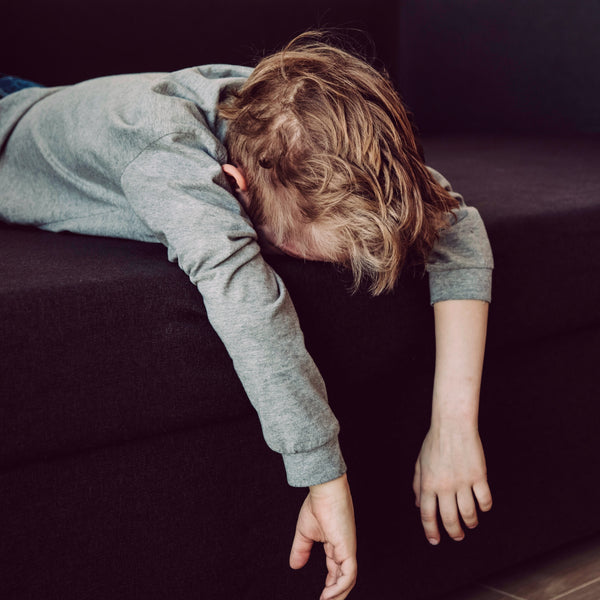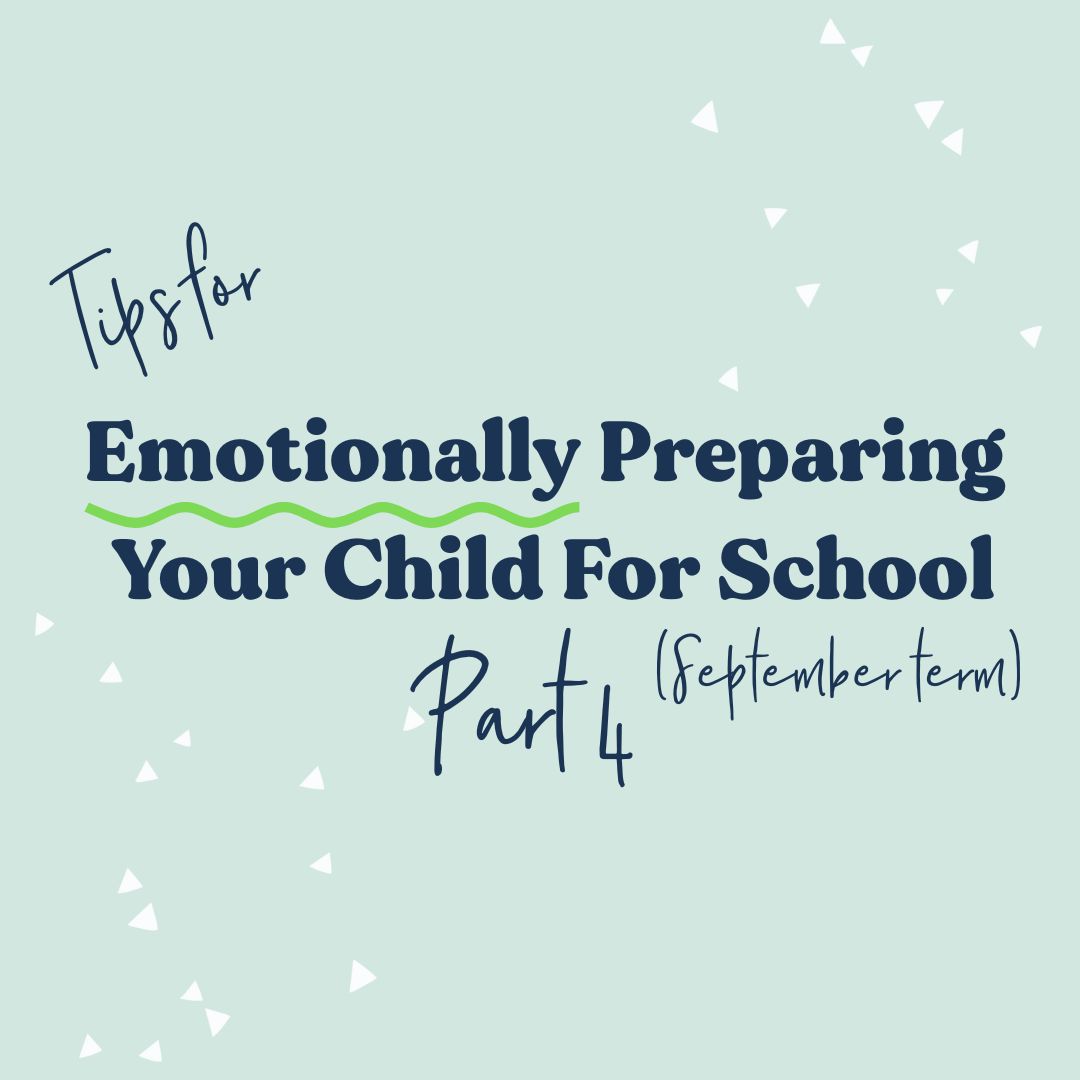Welcome back for part 4 of emotionally preparing your child for school, this instalment is relevant for new starters and school returners.
By now most children who are attending school this year will have had some time at school. I hope they have been getting on well! It is very normal to find this transition time tricky, and this might show up in a number of ways such as:
♥︎ Struggling with drop offs
♥︎ Coming out of school with what seems to be wild behaviour (being dysregulated)
♥︎ Tiredness
♥︎ Irritability
♥︎ Not wanting to meet demands (e.g. homework, tidying away toys, brushing teeth)
♥︎ Having emotional outbursts and meltdowns
♥︎ Having more fears and worries at bedtime
Some of these things might seem really out of character for your child or might have seen these behaviours before but they feel more intense right now. There are a number of things at play which could be causing them at school including:
♥︎ Separation from you
♥︎ Adjusting to the new routine
♥︎ Tiredness from a long day
♥︎ Feeling like they need to meet expectations / follow new rules
♥︎ Social demands and making/keeping friendships
They might seem absolutely fine to their teachers and be “keeping it together” at school but you suddenly notice big changes in their behaviour after school, this is called restraint collapse.
We have been speaking with Kate from NurturedChildhood about why this happens and what we can do to support your child (and make things easier for you at home too!)
Kate offers 1:1 parenting and education support and advice to families. She was a primary school teacher and has a background in child psychology, she supports lots of families with ND children, and is a mother to an autistic son. She has brought all of her experience and expertise together to offer child-centred, nurture-based support for other families.
“Why does my child struggle so much when they get home from school?”
When I was a teacher, I would often have children who appeared to be managing well in school and on the surface seemed happy. But that wasn’t what parents were seeing at home, and they would often describe a totally different child to the one I would see at school. As a neurodivergent coach, this is a narrative all too familiar and something I do a lot of work with to support families.
So, what is happening and why?
As parents you might be noticing a change in your child’s behaviour since starting school, and is particularly challenging straight after school. Perhaps their behaviour has become more challenging, intense and frequent? Parents often describe this as if a ‘switch has been flicked’, and their child can become often unrecognisable and very dysregulated. You might notice:
-
anger, towards themselves or others
-
a reduced frustration tolerance and increased irritability
-
impulsive behaviour
-
defiant, demand avoidant or disrespectful behaviour (can include rude language)
-
increased meltdowns and emotional outbursts which can include aggressive behaviour towards others
-
overwhelm or refusal in response to ‘simple requests’
It might also present itself as your child being unable to wind down at bedtime and ‘bouncing off the walls’ when they are home from school. Parents often describe their child as being ‘wired’, which can be a sign of dysregulation and sensory overwhelm. After a long day at school, children often face sensory overload, social exhaustion and emotional overwhelm.
After school can be very challenging for many families and children, and can be more prevalent at the start of the school year (although not confined to that period of time for some children).
Children might have had a whole day of dysregulation, sensory overwhelm with new smells and sensory experiences, frustration, adapting to new routines and transitions, socialisation difficulties in the playground with friends, low confidence about their work or fatigue from learning demands and pressure, trying to sit still and remember things taught previously, not calling out, listening and following instructions, suppression of feelings and lack of autonomy inside them to let out. Some neurodivergent children might also have unmet they are trying to manage, perhaps that are undiagnosed or misunderstood. The ‘letting out’ and inability to cope with aspects of normal life and usual demands is known as after-school restraint collapse and in essence is when children are ‘holding it together’ all day and then they release how they truly feel in the presence of those they trust, or in their safe place at home. They emotionally collapse.
All humans, children and adults, have a certain capacity for regulation, how much they are able to cope with before it becomes too much. Every individual has a different capacity to manage the demands around them and stimulation from new environments and people. Neurodivergent and highly sensitive children generally have a lower capacity to cope with a full day of demands and stimulation, and without opportunities throughout the day to regulate it is very likely that their dysregulation and overwhelm will be too much for them to manage.
A child’s capacity to regulate their emotions and cope with the challenges and demands placed upon them at school is often likened to a fizzy drinks bottle. At the start of the day the bottle is empty, but as the day progresses, they get full up with stuff. Children do what they need to do in order to ‘be good at school’ and so the pressure of that builds up - the pressure to 'behave', the pressure to be quiet and listen, the pressure to sit still, socialisation pressures, trying to remember previous knowledge, the pressure to share resources, the pressure to 'hold it together' emotionally. For neurodivergent children, these pressures will be greater and there may well be pressures to conform to neurotypical standards that they are unable to tolerate or manage. School can be a very different and complex environment to navigate and these pressures build up until the bottle is full. Children spend all day keeping a metaphorical ‘lid on their bottle’, holding it all in, managing to get through the day with no real evidence or external signs that they aren’t coping. But within it can feel like a giant bubble that is about to burst. The contents of the bottle are constantly shaken throughout the day and the emotions build up and up on the inside. This concept of ‘keeping a lid of their feelings’ and holding it all in is known as masking, and is often why teachers do not really know what is happening for the child inside. They spend the whole day appearing as if they are fine, and able to manage with the demands of everyday school life.
For your child, and all of this happens without the presence of a loved one and safe adult. They might be in school all day without an adult that understand and support their needs, making it even more challenging. Throughout the day there is an accumulation of dysregulating moments, and if there are no opportunities for co-regulation with a trusted adult, sensory regulation or emotional release then that will lead to very overloaded children. In the safety of their home, with the person who enables them to feel safe enough to show their true self, they unscrew that lid and the pressure that has been building all day releases. There are many articles and discussions about restraint collapse being seen as normal, and to an extent yes. Many children (neurotypical and neurodivergent) will struggle after school and need to release their bottled-up feelings, and for some this comes hand-in-hand with the exhaustion of starting school and a new term. These big emotions and large releases of frustration or anger might then ease as children begin to settle into school and adjust to new routines. However, if these become more frequent and intense then it is not something we should be labelling as ‘normal’ or acceptable for children to manage. Daily meltdowns after school, where a child has been pushed to the edge, overwhelmed and dysregulated all day isn’t something parents should be accepting and okay.
It is important to remember that these explosions of feelings are not your child being ‘naughty’ or testing boundaries/trying to ‘get their own way’. After-school restraint collapse/autistic meltdowns are exactly that — a collapse, because your child is so emotionally or physically overwhelmed that they can no longer keep it together. Many children experience tiredness after a day at school, but restraint collapse and meltdowns are more than just usual fatigue. More sensitive, deeply feeling and neurodivergent children might experience restraint collapse/meltdowns more frequently or more intensely, but it can affect all children.
Neurodivergent children, and those who have sensory sensitivities and challenges with processing sensory information might find the school environment very overwhelming and might have a reduced capacity to manage their emotions and other demands throughout the day. At times it might appear as if it has settled, but then present itself again after a challenging day for your child, or if they are very tired or poorly and therefore their capacity to manage their emotions and demands is lowered. This might also be true for children navigating changes at home whether that be a move of house, new routines, parental separation or the loss of a loved one – these will all impact your child’s tolerance of demands and capacity to manage their emotions. 
Ways to support your children who are experiencing restraint collapse...
Be mindful at school pick up
Take a deep breath before you collect your child and be ready to meet their emotions for what they are. Let your child know that you are there for them and can hold their big feelings. Your calm energy will help to regulate and ground your child. Use a soothing tone and try to be their calm in the storm.
Greet your child with a smile and a hug instead of questions about their day. Remember that your child has spent all day answering questions and navigating various demand and expectations. After school is the time to regulate and decompress, so try to take the pressure off. On the way home try to give your child some time and space, to process the day. After they have had time to eat and drink something, you might want to ask them what their body needs. If you’re driving home perhaps put on some relaxing music and stay quiet. Every child is different, and this will depend hugely on your child. Always take their lead, but straight after school might not be the time for big conversations.
Have a snack ready
Children, like all of us, are often more irritable when they’re hungry and tired. One of the best ways to help your child regulate is to offer a snack as soon as you can, to pick up their energy levels after a full and stimulating day. Crunchy foods can be very regulating for ND children, particularly sensory seekers, and if the snack can also offer some protein, that will help to rebalance their blood-sugar levels. Cold snacks can help to soothe their senses (a cold drink or fruit, or home-made ice lolly) and are another good option at school pick-up.
Regulation on the way home
Think of ways for your child to regulate on the way home – can you scoot or walk part of the way, so they have time to move? Perhaps stop off at a park on the way home so they have the chance to run around in a large open space. A busy playground on the way home might not be the best option for your child to regulate as this can be more overwhelming and stimulating for them. If you are driving home, ensure your child has a snack in the car and a sensory kit with different items inside that can help them to regulate.
We know that water is hugely regulating for our bodies, so if you live near water (a river, lake, pond or sea) perhaps you could stop off and play near the water or have an after-school snack sat by the side of the water.
What does your child need?
Is it quiet time in front of a screen? Is it sensory play with you? Is it a big hug and reading a story or doing a puzzle together? Is it time playing with their favourite toys? Every child is different, and their needs and regulation strategies and preferences will be different. And this might change from one day to the next, so be ready to adapt. Every day is different in terms of our capacity to cope, so some days your child might need more support than others.
Comfort clothes and toys
Help your child to get comfy when they get home, getting dressed into their comfiest clothes and using toys or sensory tools that help to regulate them. For example, a weighted lap pad or blanket, time inside a sensory tent.
Water and play
Free play gives children an outlet to release their emotions and feelings. Play is an important part of emotional development for children and through play, children can release and express their feelings. Whilst the weather is warm, try to create opportunities for your child to regulate outside (possibly in your garden) with some water play. This can also be done inside with a long play bath after school, giving them lots of time to splash and release their feelings. Some families find that having a bath before bedtime can be dysregulating for their neurodivergent child, so why not try this in the afternoon straight after school? Rather than remove bath time, I would try to encourage nice long play baths where your child can play and splash before dinner. We know that water is hugely regulating for our nervous system, and if we add in some soothing Epsom salts (magnesium) that will further support your child after school.
Prioritise connection
Try to find small ways to connect with your child outside of school time, giving them your undivided attention. This might look like playing a favourite game together to help them unwind, planning a special meal, reading together, watching their favourite tv show snuggled together and perhaps an increased bedtime routine to allow for more opportunities to connect.
Before school, try to find an opportunity for connection, however small. Try to give your child a little bit more of you in the mornings if you can and fill up their emotional cup before separation. Spending this extra time together in the morning can help ease your child into the separation of the school day while feeling more strongly attached to you.
Release those feelings
At some point in the afternoon, I wouldn’t advise just before bed, you could ask your child if they have any ‘tangles/knots that need to be undone’ or ‘squigly feelings’ that want to come out or are making them feel unsure. However, you phrase it with your child give them opportunities to discuss their feelings or worries outside of an emotionally charged moment and suggestions for how to let those big feelings out – stomp them out, jump them out on a bed or trampoline, bash them out in a pillow fight or sofa cushion wrestle.
I always say to the families that I work with that we need to parent proactively rather than reactively. Plan in regulation activities before school too that will support your child, so they leave for school feeling more regulated. This is especially important for children who wake up early and have a lot of time before school starts – how are they spending this time? I have created a workshop specifically about this, looking at ways to support your child before and after school.
Reduce demands and expectations
Be mindful of the overall expectations being placed on your child across a week. For many children, quieter afternoons and weekends will be necessary to enable them to recharge and regulate after school. Some schools don’t allow reception children to attend after school clubs for this reason. As parents, we might want to consider reducing other demands and social engagements, so that your child is able to decompress and have a regulation reset over the weekend.
Our goal as parents should never be to ‘stop healthy expressions of feelings’ but the frequency and intensity of your child’s exhaustion and emotions needs to be supported and monitored. If you would like any support with your child’s big emotions/meltdowns before or after school, then please get in touch.
Support your child through separation
We can support our children by helping them to feel connected to us even while apart (known as ‘bridging strategies). Allow your child to ‘take you to school with them’. There are lots of suggestions on my NurturedChildhood Instagram page on how to do this, but some examples of this might be to write notes for their lunch box, fill their hands full of kisses, put a photo of your family in their bag. This allows children to have something tangible to remind them that you are thinking of them and supporting them through their day. I also have suggestions of books to read with your child, which can help them to know that even when you are not together, you are still connected through your love and hearts, and that this connection can never be broken. Even when apart.
As the school year goes on, you can expect after-school restraint collapse to ease up a bit - both because of your children’s increasing maturity and their adjustment to the new routine and environment. If their big emotions seem to be continuing well beyond the first term and you would like some support, then please reach out. As a parent and a teacher I have experience of supporting children from both angles. I will be covering lots more ideas and support through a series of posts on my Instagram page over the next few weeks.
Huge thanks to Kate for sharing these amazing tips with us. It really helps to have an understanding of why our children are behaving the way they are and that they are not just "acting out" even if it looks like they are! She is super lovely and totally gets it!
Lastly,
I want to talk to you briefly about separation and regulation strategies.
I talk about separation anxiety a lot as this has played a big part in our going to school struggles over the years, I am sure you are aware that this is why I designed the Love Note Patches so I could support my daughter and other children like her. The reason that they work (they aren’t a magic fix but they will certainly support your child) is because they are a bridging strategy (as discussed above) and they help your child to feel connected to you when you are not there. They may be a little more confident in the morning by knowing that they have a reminder of your love for when they need it, and they might seem a little less anxious in the day because they can access it whenever they want for comfort. It is also a reminder that they will be back with you again soon.
Here are a couple of tips to get a little more out of them:
- Give the patch a little rub or a kiss in the morning when you drop your child off as part of your goodbye routine. You can tell them that it is charged up with love and that they can give it a little rub whenever they need it.
- Have a patch from your child (or something else that is theirs such as one of their toys or a picture they drew you) and tell them you are keeping it with you for the day to remind you of them. For some children it really helps to know that you won’t forget them and that you will be thinking of them during the day too.
Sensory strategies for regulation
My mum used to call it my “mad half hour” because I would come home from school and zoom all over the place, jumping off things and laughing hysterically (I actually remember doing this!), but now I have more understanding of my nervous system and actually I was dysregulated from the day at school and this was my body going into a “hyper” state. I see this a lot in my kids too! The trick here is to try and catch them before they have a meltdown and put some strategies in place because once in meltdown mode there isn’t too much you can do until it passes. Using some of the strategies above from Kate such as having quiet time, snacks and reducing demands will help, you can also use other sensory strategies like snuggling them up in a blanket, blowing bubbles (calming breath work) and playing with sensory activities like water beads or kinetic sand depending on your child.
For neurodivergent children (including those that are highly sensitive) it is likely that it would also be beneficial for the school to also put some strategies in place to support them to stay regulated throughout the day such as allowing them to have sensory fidgets at school, movement breaks and quiet time built into their day. Our brains and our bodies work together here and we can use physical strategies to help us stay emotionally regulated (I find this all fascinating by the way). If after the transition period your child is still struggling after school it is definitely worth speaking to their teacher about it to see if there is anything they can do to support them during the day too (even if they seem “fine” at school). Kate can also offer advice on what accommodations you can ask school for and how to reach out to them:
"For some children who are more sensitive to their environment and changes, and those who are neurodivergent, they might need more sensory support before and throughout the day. If you would like to discuss this we can look at your child’s sensory profile and their sensory diet across the week, adding in supports and adjustments where needed. Everyone has sensory needs - after a long day teaching I couldn’t cope with any music or tv noise in the evenings. My capacity for noise was maxed out! This might be the same for so many children and together we can become detectives and work out what your child needs more or less of"
Thanks for tuning in again, it was a biggie this time with a lot to cover! I will also be talking about tricky drop off's on Instagram so keep an eye out of this is something you and your little ones have been struggling with.







